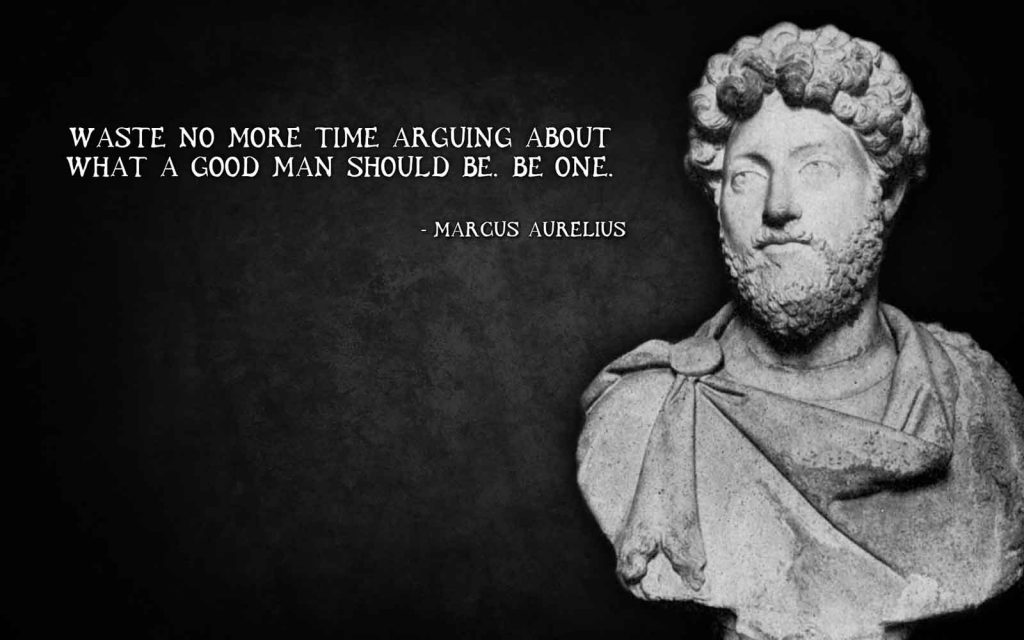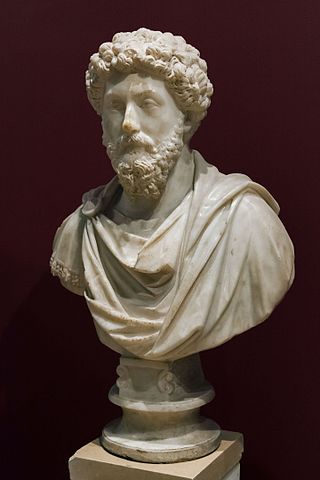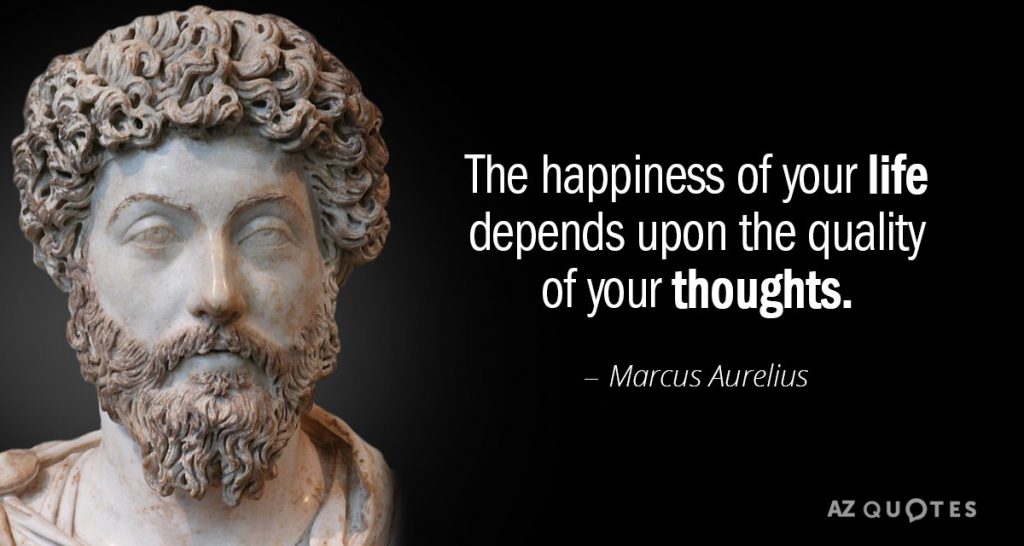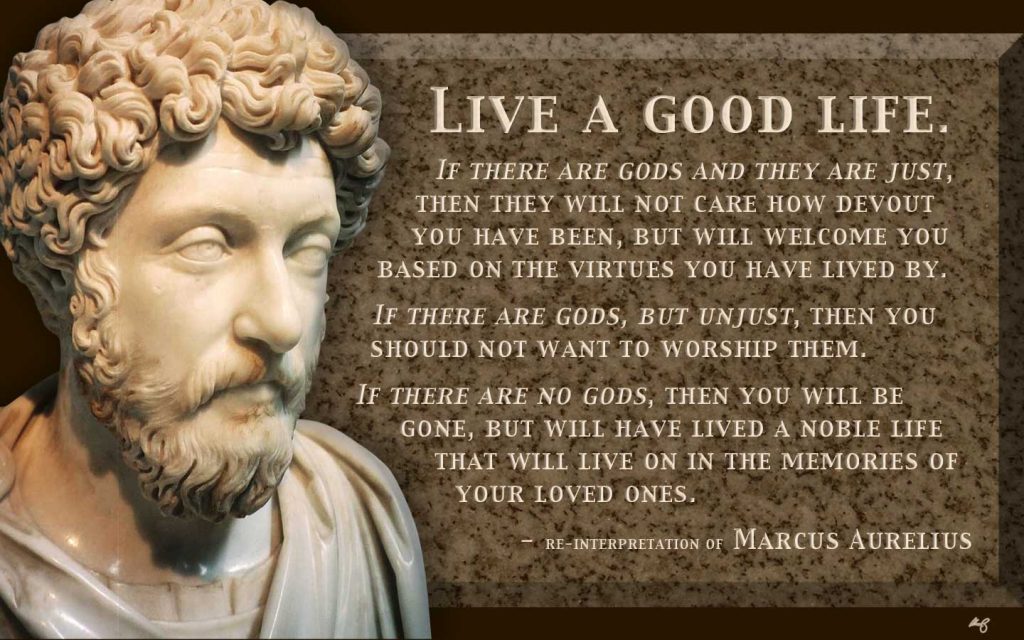“Meditations” by Marcus Aurelius shouldn’t exist, but I’m glad it does. It is a set of personal writings by the Roman emperor and provides a wealth of insight into the man who struggled with the same things we still struggle with today.
Meditations, or Τὰ εἰς ἑαυτόν, literally translates as “things to one’s self.” It is a collection of private notes Marcus wrote to himself.
In the twelve books of “Meditations,” you see his quest for guidance on doing the right thing and to continually improve himself. One of his more famous quotes, “Waste no more time arguing what a good man should be. Be one,” is the logical conclusion anyone could come to after spending time seeking out how to be a good man. Marcus felt that instead of endlessly debating what a good man is or how to be one, just get out there and be one.
BOOK ONE, MY FAVORITE BIT
Book one is a list of reflections of all the people Marcus is grateful toward for having the opportunity to learn valuable lessons. It is my favorite because there are many good examples that I already try to practice and Marcus gives credit to those that taught him. In 1.6 he mentions what he learned from Diognetus.
Not to waste time on nonsense. Not to be taken in by conjurors and hoodoo artists with their talk about incantations and exorcism and all the rest of it. Not to be obsessed with quail-fighting or other crazes like that. To hear unwelcome truths.
In 1.7, he speaks about Rusticus and learning “the recognition that I needed to train and discipline my character.” He goes on to speak about not be overly obsessed with his own interests and delivering speeches and triteness. He wants to be ordinary and straightforward. He doesn’t want to be the kind of person who writes haughty things and then strolls around waiting for empty platitudes to fill his ego.
More importantly, he wants to “read attentively – to not be satisfied with ‘just getting the gist of it.’” When I read those words, I thought about how many people are happy with the gist of things. They don’t want to delve deeper and get a greater understanding. It both inspired me and made me sad.
In 1.10, he learned a lesson from Literary Critic Alexander that many still need to learn today.
Not to be constantly correcting people, and in particular not to jump on them whenever they make an error of usage or a grammatical mistake or mispronounce something, but just answer their question or add another example, or debate the issue itself (not their phrasing, or make some other contribution to the discussion – and insert the right expression, unobtrusively.
In all of “Meditations,” one thing that lingers is from 1.14 – never to doubt your friends’ affection for you. A little farther on, he discusses having a brother, “whose character challenged me to improve my own. One whose love and affection enriched my life.”
Book one is about ways to live, how to treat others, and how to be respectful of everything around you. It contains much of the ideals I continually work toward. Unlike Marcus, I seem to fail at them more than succeed, but that, too, is a lesson.
THOUGHTS FOR YOURSELF
Marcus, is right when he says in 3.4 that we should not waste our time on Earth worrying about other people unless it affects the common good. At the time I read the section, I was struggling to spend less time on social media. It’s a time-sink and has not been good for my mental health. It keeps me from doing anything useful.
He goes on to say, “You’ll be too preoccupied with what so-and-so is doing, and why, and what they’re saying, and what they’re thinking, and what they’re up to, and all the other things that throw you off and keep you from focusing on your own mind.”
Marcus also writes some things over and over because he has yet to accomplish the task. It is not unlike myself when I write a post about my struggles. There are themes that come up again and again because I have not yet conquered the task I set forth.
When you see him repeating an idea or thought, you have to remember, these writings were for him alone. You can almost put yourself in his place as he works his way through something that was difficult. His return to the same ideas show that some were helpful, while others were a reinforcement.
I do not agree with much of Book Four. There is a constant reminder of “it happened to you, good it was meant to be” throughout the chapter. Personally, it is difficult to not find those notes repugnant. It would have been nice, however, to be able to speak with him and have an argument for better clarification on this matter. I don’t believe he thought it was black and white, but he writes it so often, that you wonder.
ON HOW TO BEHAVE AND INTERACT WITH PEOPLE
In 6.21, Marcus writes what I have also said. If you can refute what I say or show me a mistake, please do. I am seeking the truth in everything. “…the truth never harmed anyone. What harms us is to persist in self-deceit and ignorance.”
Our modern society has been turned into one where we are shamed for asking for help. The American ideal to do it all by yourself is harmful. Marcus knew this two thousand years ago.
7.7 Don’t be ashamed to need help. Like a soldier storming a wall, you have a mission to accomplish. And if you’ve been wounded and you need a comrade to pull you up? So what?
Book 11 discusses ways to behave around people and how to react when people try to harm you. In 11.13, Marcus essentially asks what good it does for me to stoop to someone’ s level, to hate, to do harm solely because I have been harmed.
Someone despises me.
That’s their problem.
Mine: not to do or say anything despicable.
Someone hates me. Their problem.
Mine: to be patient and cheerful with everyone, including them.
Marcus was definitely a better person than me on this matter. It is still something I can get better at.
My grandmother said if you don’t have anything good to say about someone, don’t say anything at all. She lived by this statement. What is the point of denigrating someone else? You don’t like them? Fine. You don’t have to reduce yourself to their level to prove their unlikability. Simply remain quiet. Their actions will reveal who they are. You do not need your words to help others reach the same conclusion. They will reveal their character themselves.
He was also concerned about not giving in to anger.
When another blames you or hates you, or people voice similar criticisms, go to their souls, penetrate inside and see what sort of people they are. You will realize that there is no need to be racked with anxiety that they should hold any particular opinion about you.
In 11.15, he further discusses how to act around others and obviate negativity.
False friendship is the worst. Avoid it at all costs. If you’re honest and straightforward and mean well, it should show in your eyes. It should be unmistakable.
I find great comfort in an emperor who struggled with the same things I do. Here is a man who had the ultimate power on Earth. Instead of doing whatever he wanted, when he wanted, he spent his time trying to be a better person and trying to live a good life. This powerful man, who lived two millennia ago, struggled with the same things I, and every other human, do.
A SEARCH FOR MEANING
Marcus had a deep understanding of human nature, how we behave, and what we hope to achieve. His writings may have been to himself, but they provide guidance through ethical reflection. His honesty allows the reader to become intimately acquainted with him precisely because they are reading what he was thinking.
One theme I struggled with is the stoic idea that a man can only be harmed by allowing his reactions to things out of his control to overcome him. While it may be easy to say not to worry about things out of your control, such a health or fame, because it is irrelevant, I think the truth is more nuanced. Each time Marcus brought these ideas up, I struggled to understand his point of view.
In Gregory Hays’ translation of “Meditations,” I walked away with a sense of a man trying to be the best man he could be. His “things to one’s self” is all the evidence we need. He wasn’t handing down wisdom, but what he wrote made me realize he was a person of integrity who wanted to be better. Being good isn’t easy for any of us. It’s even more difficult for someone with ultimate power. To know that he struggled in that effort is comforting.
My grandmother said words don’t define our character, our actions do. Living by the ideals you’ve set forth speaks more about a person than words. Marcus tried to lead by example. Alone, where no one could see, he wrote of his struggles.
“Meditations” was not meant for my eyes, or yours. It wasn’t about discussing philosophical concepts. It is a reflection of a man processing his life through the stoic lens he chose to live by.
https://youtu.be/5897dMWJiSM
A BETTER MAN
Marcus was consistently good. He continually worked to do good and be good.
Matthew Arnold, the essayist, remarked in 1863, that in Marcus we find a man who held the highest and most powerful station in the world—and the universal verdict of the people around him was that he proved himself worthy of it. Machiavelli considers the time of rule under Marcus “golden time” and him the last of the “Five Good Emperors.” Machiavelli would also describe Marcus Aurelius as “unassuming, a lover of justice, hater of cruelty, sympathetic and kind”
Through all his struggles, Marcus never gave up. He found a way to carry on. We all need to remember the standards we have set for ourselves, who we aspire to be and try to fulfill that goal.
“If it is not right, do not do it, if it is not true, do not say it. Waste no more time arguing what a good man should be. Be one.”
The best free translation is by George Long.
Internet Archive editions
Project Gutenberg
LibriVox public domain audiobook






3 Pingbacks